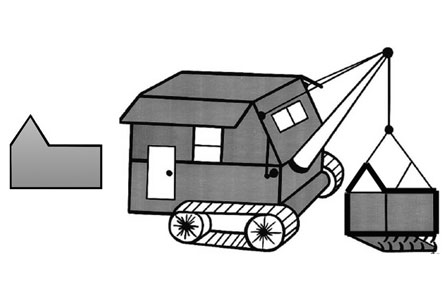Homework blues
A good mood may not be so great for school work
By Emily Sohn
Homework can put you in a bad mood, and that might actually be a good thing. New research suggests that, in some cases, being too happy can hurt your performance on certain kinds of tasks.
Researchers from the University of Plymouth in England wondered whether mood might affect the way kids learn. To find out, they performed two learning experiments with children.
 |
|
A new study of how mood affects thinking styles presented children with problems such as the one shown above. Participants searched for a houselike shape, left, in the larger drawing of a vehicle, right. |
| Schnall |
The first experiment enlisted 30 kids, ages 10 and 11. Each child was given 20 problems in which a triangle or houselike shape was hidden inside a different, larger image. The kids had to find the small shape while sitting in a room with either upbeat or gloomy classical music playing in the background.
As a measure of mood, the scientists asked the kids to point to one of five faces, ranging from happy to sad. Children listening to the upbeat music tended to point to the smiley faces, indicating that they felt happy. Kids surrounded by gloomy tunes pointed instead to the frowns.
The researchers found that sad kids took at least a second less to find the small shapes. The gloomy kids also correctly identified an average of three or four more shapes.
In the second experiment, 61 children, ages 6 and 7, faced the same type of shape-finding problems. Instead of listening to different types of music, though, they watched one of three scenes from an animated film. One scene was happy. One was neutral. One was sad.
In this study, kids’ moods tended to reflect the scene they had seen.. And just like in the first experiment, kids who felt sad or neutral performed better on the tests compared to happier kids. They solved an average of two or three more problems.
The researchers hypothesize that feeling down makes people more aware of details, perhaps because sadness makes us more likely to focus on a problem or difficult situation. Some studies suggest that mildly sad adults do better than happy ones on tests of memory, judgment and persuasive argument that involve attention to detail.
Not all scientists agree with these conclusions, however. Other studies suggest that people who feel happy are better able to switch between focusing on details and focusing on the big picture. And the new studies have flaws, critics say. It’s possible, for example, that lively music in the first experiment distracted kids from finding shapes.
While scientists work on sorting out the answers, it still might be worth tailoring your tasks to your mood. After eating a yummy bowl of ice cream, for instance, write an essay. Save the math problems for after you’ve been told you can’t have seconds.
Going Deeper:







